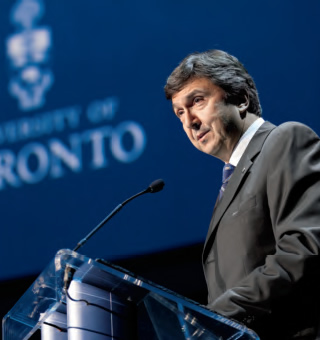The university-as-ivory-tower remains a popular myth, but the reality is very different. Great universities are always in a process of evolution. They are hotbeds for innovation, profoundly influenced by, and influencing in turn, their societies and the wider world.
So it is at the University of Toronto. In a world moving at light speed, excellence in the cornerstone academic disciplines remains important. But the boundaries between those disciplines are dissolving. What’s emerged at U of T is an impressive range of extra-disciplinary units with the diversity and agility needed not just to keep up, but to set the pace. I’ll highlight four of these exciting new centres.
Three years ago, with transformative support from alumnus Peter Munk, U of T’s highly regarded Centre for International Studies became the Munk School of Global Affairs. The word “global” implies a view of the world in which nations are more interconnected than ever and issues increasingly demand multilateral action. To address such global complexity, the Munk School is forming partnerships with faculty throughout the university as well as with a network of international institutions and governments. Students are thriving, and the Munk School professors are in the news every week for their influential research and commentary.
For decades, U of T’s School of Hygiene was a North American leader. The school was absorbed into the Faculty of Medicine in the 1970s partly to help integrate health promotion with disease treatment. What became clear, however, was that health required integration not just within but beyond Medicine. With a visionary gift from Paul Dalla Lana, U of T was able to establish a new School of Public Health in 2008. Now, in addition to its core strengths in public health sciences, the Dalla Lana School is developing cross disciplinary excellence in healthy cities and communities, global health, and healthy public policy.
A similar integrative theme characterizes U of T’s new School of the Environment. It will gather academic work on the environment under one big tent, giving the subject greater focus and a higher profile, and creating new opportunities for our students. While U of T is already very strong in environmental science, the school also has an opportunity to forge links with the Dalla Lana School and the School of Public Policy and Governance in order to translate our knowledge about the environment into practices that protect health and policies to foster sustainable development.
For its part, the School of Public Policy has been multidisciplinary from its inception. It brings together scholars from economics, sociology, political science, law, medicine, philosophy and business, among others. It also forges links between these researchers and practitioners of public policy from government and non-profit organizations. The biggest winners, however, are students. They get to develop a rich conceptual framework for policy development and analysis.
In a way, then, we’ve come full circle. We talked a lot for years about external partnerships to give students and faculty valuable opportunities. Now we’ve realized the importance of internal partnerships – the ones we’re making across faculties and schools. And here, in a time of accelerating social and technological change, U of T’s size and disciplinary strengths are proving to be a distinct advantage. We have broad and deep foundations on which our new schools are building to create dynamic trans-disciplinary programs that meet students’ – and society’s – fast-changing needs.
***
Readers will note the article on page 13 about the appointment of Professor Meric Gertler as my successor as president. The Search Committee and the Governing Council are to be congratulated for an excellent decision. They have placed our university in the hands of an outstanding scholar, a strong and experienced academic leader, a gifted teacher, and an individual of vision and integrity who is deeply committed to this institution and its special role in Canada and the world. There will be further coverage of the transition in subsequent issues. For now let me say that I look to the future with great confidence that the President’s Office is in very capable hands.
Sincerely,
David Naylor






